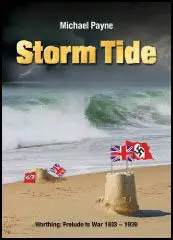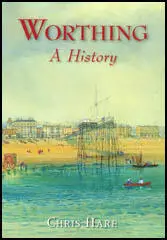History of Worthing

Title: Storm Tide: Worthing 1933-1939
Author: Michael Payne
Publisher: Verite CM
Price: £12.99
Bookshop: Amazon
Spartacus Website: Oswald Mosley
Category: Worthing
Set against the backdrop of national and international events, this book traces the momentous period leading up to conflict as witnessed by the people of Worthing. Topics explored include the bitter arguments between Conservatives and Pacifists over rearming; the attempts by the British Union of Fascists to turn the town into a Blackshirt stronghold; the arrival not only of the deposed Emperor of Ethiopia, but of Basque children escaping the horrors of war-torn Spain, Jewish refugees fleeing Central Europe, and evacuees from London.

Title: Worthing: A History
Author: Chris Hare
Publisher: Phillimore
Price: £18.99
Bookshop: Amazon
Spartacus Website: History of Worthing
Category: Worthing
Worthing officially became a town with the passing of the Worthing Town Improvement Act in 1803, though the population then was no more than 1,000. The town developed very quickly, and fashionable society moved in after the visit in 1798 of George III's youngest daughter, Princess Amelia. Conflict emerged very early on between the new residents and the local population, and attempts to reform the character of the town were often strongly resisted, with annual confrontations between angry mobs and the local police. The town's reputation for scandals and demonstrations continued into the Victorian times, as the riots against the Salvation Army, which led to the reading of the Riot Act in 1884, ensured the town gained national attention for all the wrong reasons. The same is also true of the typhoid epidemic of 1893 and the visit of Oscar Wilde in 1895 - just prior to his disgrace and downfall. In the 20th century, the trauma of the First World War allowed a new Worthing to emerge, this time with conflicts between generations rather than classes, as the retired folk coming into Worthing had very different priorities to those seeking to modernise the town. The book concludes by considering how a council that sought to ban rock'n'roll in the 1950s and was still censoring films in the 1980s was able to embrace change and a new direction for Worthing.
